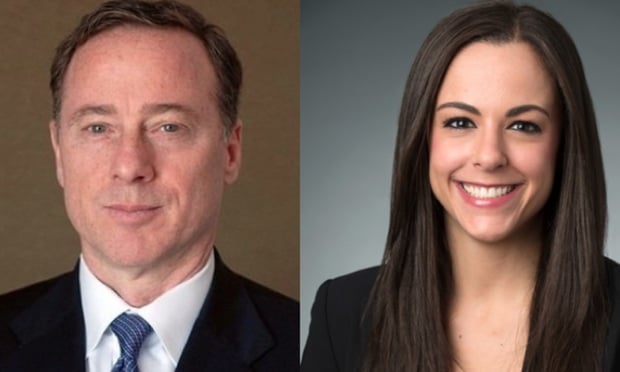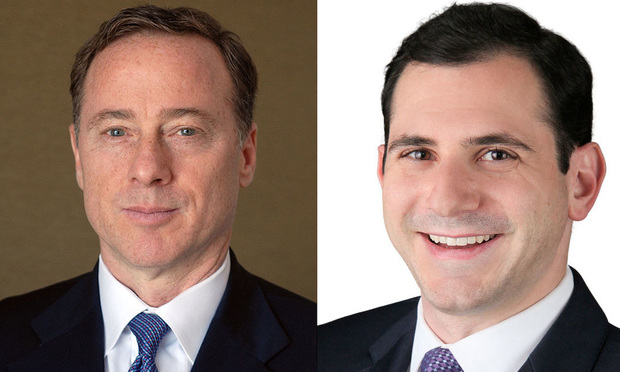Steven M Witzel

December 31, 2019 | New York Law Journal
Incentivizing SEC Whistleblowers and Cooperating CompaniesIn this Corporate Crime column, Steven M. Witzel and Chelsea P. Azrak discuss two separate SEC annual reports setting forth expected new policies and highlighting recent practices designed to further incentivize individual whistleblowers and cooperating companies to report and address violations of the securities laws.
By Steven M. Witzel and Chelsea P. Azrak
9 minute read

September 04, 2019 | New York Law Journal
Handicapping the 'Varsity Blues' SentencingIn this Corporate Crime column, Steven M. Witzel and Renee E. Turner provide an overview of the college admissions scandal; the sentencing issues faced by the various groups of defendants; the bellwether Vandemoer sentencing and its implications; and the arguments for severe sentences as well as for leniency.
By Steven M. Witzel and Renee E. Turner
11 minute read

September 05, 2018 | New York Law Journal
Marijuana Use and Supervised ReleaseIn their Corporate Crime column, Steven Witzel and Andrew Cashmore review the issues that district courts face when confronted with the violation of a supervised release for using marijuana, at a time when the nation's views on drug use are rapidly evolving.
By Steven M. Witzel and Andrew B. Cashmore
12 minute read

May 02, 2018 | New York Law Journal
Increasing Civil and Criminal Enforcement in the Municipal Bond MarketIn this Corporate Crime column, Steven M. Witzel and Daniel C. Fishbein focus on recent and novel enforcement actions in the municipal bond space. They survey municipal securities regulatory changes and enforcement innovations geared toward municipal issuers, and look at the future direction for enforcement and regulation in the muni-bond market.
By Steven M. Witzel and Daniel C. Fishbein
16 minute read

September 06, 2017 | New York Law Journal
FCPA StandstillIn his Corporate Crime column, Steven M. Witzel, joined by Arthur Kutoroff, write: Notwithstanding Trump administration antipathy to "zealous" anti-corruption enforcement, and perhaps assuaged by post-election expressions of support from administration officials and confidence in line prosecutors, commentators have near-unanimously predicted a steadfast continuation of this robust FCPA enforcement. The facts to date do not support these initial predictions.
By Steven M. Witzel and Arthur Kutoroff
19 minute read

May 03, 2017 | New York Law Journal
Should Culpable Whistleblowers Be Eligible for SEC Whistleblower Awards?In their Corporate Crime column, Steven M. Witzel and Nicole R. Love of Fried, Frank, Harris, Shriver & Jacobson survey and analyze current SEC regulations concerning culpable whistleblowers, SEC orders providing monetary awards to whistleblowers under the program, Chairman Hensarling's proposed legislation, and the potential implications of eliminating monetary awards to culpable whistleblowers. They also present a potential path forward in the form of a compromise.
By Steven M. Witzel and Nicole R. Love
32 minute read

January 04, 2017 | New York Law Journal
Cybersecurity and the Incoming Trump AdministrationIn a Corporate Crime column, Steven M. Witzel and Michael A. Kleinman of Fried, Frank, Harris, Shriver & Jacobson address how a Trump Administration might approach cybersecurity issues, particularly criminal prosecutions and regulatory oversight.
By Steven M. Witzel and Michael A. Kleinman
28 minute read

August 31, 2016 | New York Law Journal
Electronically Stored Information and the Fourth AmendmentIn his Corporate Crime column, Steven M. Witzel writes: In dealing with issues involving electronically stored information, Congress, courts and commentators are struggling to find the proper balance between preserving Fourth Amendment rights and providing effective tools for government investigations.
By Steven M. Witzel
18 minute read

May 05, 2016 | New York Law Journal
Implications of the DOJ and Apple Legal Fight That Wasn'tIn their Corporate Crime column, Steven M. Witzel and Joshua D. Roth provide an overview of the facts surrounding the DOJ's legal fight with Apple, examines the legal framework that governs hacking, and concludes that courts should more closely supervise the government when it engages in such activities.
By Steven M. Witzel and Joshua D. Roth
23 minute read

January 07, 2016 | New York Law Journal
Mini-En Banc Review in the Second CircuitIn their Corporate Crime column, Steven M. Witzel and Samuel P. Groner discuss the Second Circuit's use of the "mini-en banc" when it desires to overrule one of its precedents but there is no intervening Supreme Court decision that it can point to for justification.
By Steven M. Witzel and Samuel P. Groner
23 minute read



